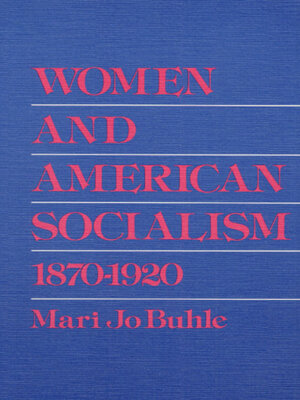
Sign up to save your library
With an OverDrive account, you can save your favorite libraries for at-a-glance information about availability. Find out more about OverDrive accounts.
Find this title in Libby, the library reading app by OverDrive.



Search for a digital library with this title
Title found at these libraries:
| Library Name | Distance |
|---|---|
| Loading... |
Socialist women faced the often thorny dilemma of fitting their concern with women's rights into their commitment to socialism. Mari Jo Buhle examines women's efforts to agitate for suffrage, sexual and economic emancipation, and other issues and the political and intellectual conflicts that arose in response. In particular, she analyzes the clash between a nativist socialism influence by ideas of individual rights and the class-based socialism championed by German American immigrants. As she shows, the two sides diverged, often greatly, in their approaches and their definitions of women's emancipation. Their differing tactics and goals undermined unity and in time cost women their independence within the larger movement.|Introduction xiii
1 German-American Socialists and the Woman Question 1
2 The Woman's Movement and Socialism, 1870-1900 49
3 Grass-Roots Origins, 1900-1908 104
4 The Woman's National Committee, 1908-13 145
5 Women's Labor 176
6 Woman Suffrage 214
7 Sexual Emancipation 246
8 Autumn Song 288
Heritage Lost and Regained 318
Index 329
Illustrations following pages 134 and 272|"This splendid book should demonstrate to the still unconvinced that the new scholarship of the past decade on women has, by enriching our understanding of the place of women, deepened our understanding of the historical process in general. . . . The exhaustive and imaginative research in this study creates a texture of rich detail about a variety of little-known aspects of women's history, labor history, and radical history and begins the rewriting of the history of American socialism."—Journal of American History
"A lively and provocative analysis of the political battles and intellectual conflicts faced by women committed to both socialism and women's emancipation."—International Labor and Working-Class History
"A brilliantly comprehensive, analytical, and perceptive work on an important movement in US history. Highly recommended."—Library Journal
|Mari Jo Buhle is William R. Kenan Jr. University Professor Emerita at Brown University and the author of Feminism and Its Discontents: A Century of Struggle with Psychoanalysis and The Concise History of Woman Suffrage.
1 German-American Socialists and the Woman Question 1
2 The Woman's Movement and Socialism, 1870-1900 49
3 Grass-Roots Origins, 1900-1908 104
4 The Woman's National Committee, 1908-13 145
5 Women's Labor 176
6 Woman Suffrage 214
7 Sexual Emancipation 246
8 Autumn Song 288
Heritage Lost and Regained 318
Index 329
Illustrations following pages 134 and 272|"This splendid book should demonstrate to the still unconvinced that the new scholarship of the past decade on women has, by enriching our understanding of the place of women, deepened our understanding of the historical process in general. . . . The exhaustive and imaginative research in this study creates a texture of rich detail about a variety of little-known aspects of women's history, labor history, and radical history and begins the rewriting of the history of American socialism."—Journal of American History
"A lively and provocative analysis of the political battles and intellectual conflicts faced by women committed to both socialism and women's emancipation."—International Labor and Working-Class History
"A brilliantly comprehensive, analytical, and perceptive work on an important movement in US history. Highly recommended."—Library Journal
|Mari Jo Buhle is William R. Kenan Jr. University Professor Emerita at Brown University and the author of Feminism and Its Discontents: A Century of Struggle with Psychoanalysis and The Concise History of Woman Suffrage.







